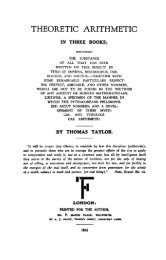The Mystical Hymns of Orpheus - Platonic Philosophy
The Mystical Hymns of Orpheus - Platonic Philosophy
The Mystical Hymns of Orpheus - Platonic Philosophy
You also want an ePaper? Increase the reach of your titles
YUMPU automatically turns print PDFs into web optimized ePapers that Google loves.
OF ORPHEUS. I I<br />
Hear, blessed Venus 11, deck'd with starry light,<br />
In Sleep's deep silence dwelling Ebon night !<br />
But Plato says he shdl da~e to speak concerning it, because<br />
he is going to assert something afi~matively about it. <strong>The</strong><br />
dread, however, is lest we should be led to something unappropriate<br />
and vile in such like doctrinal concerns. He<br />
is also concordant in what he says about the supercelestial<br />
place, with what he asserts in [the first hypothesis <strong>of</strong>] the<br />
Parmenides, about the first principle <strong>of</strong> things. For he<br />
there indicates this principle by negations ; except that he<br />
absolutely denies all things <strong>of</strong> the first principle : but <strong>of</strong> the<br />
supercelestial place he denies some things, and affirms others.<br />
For the Goddess Night is superior to certain orders, but<br />
inferior to others ; and as the first principle <strong>of</strong> things is<br />
superessential, so Night is supercelestial [i. e. is above that<br />
intellectual order which is denominated Heaven]. Why,<br />
however, are souls not said to see Heaven, but to become<br />
situated in, and be conjoined with it, yet are not conjoined<br />
with the natures above Heaven, but perceive them only?<br />
In answer to this it may be said, that it is necessary contact<br />
should exist, as far as to a certain thing. Why, therefore, as<br />
far as to this ? Because neither are the Gods under Jupiter<br />
said to be united to Phanes ; but this is alone asserted <strong>of</strong><br />
Jupiter, and he is said to be united through Night as a<br />
medium.<br />
But how does Plato say, that the supercelestial place is<br />
without colour ? Is it in the same manner as we say, that<br />
Hermann is <strong>of</strong> opinion that the line Nut ysvsois mu-<br />
rwv, qu Kai Kurprv ~aXeawpcv, i. e. " Night, the source <strong>of</strong><br />
all things, whom we also call Venus," is an interpolation.<br />
But there is no reason whatever for this supposition : for<br />
Venus in the hymn to her is called vvmcpia, and +rXorav-<br />
VVX€ uepuI)).

















